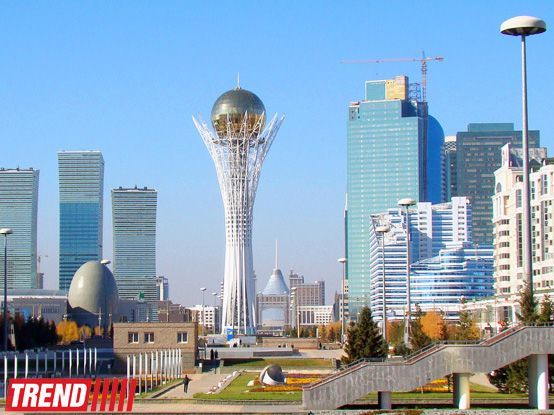Astana, Kazakhstan, Feb.3
By Daniyar Mukhtarov - Trend:
Failure to conduct summit on Ukraine in "Normandy format" in January in Astana in no way reduced the foreign status of Kazakhstan as a state that was trying to assist in the negotiation process between the conflicting parties, said Kazakh political scientist, director of the Risk Assessment Group Dosym Satpayev.
"The conflict turns into a protracted one," Satpayev told Trend. "In any case the meeting in Astana would be one of the elements of a long process of building relations between the conflicting parties."
He said that Astana only performed the role of mediator, and is not expecting a speedy result.
"Kazakhstan was not going to intervene actively in the negotiation process, but only offered the conditions for negotiations, perhaps in the prospective of joining of the United States to the process in the future," said the expert. "Kazakhstan as a mediator has fulfilled its role. And the peacekeeping initiatives of Astana were welcomed by the US, as well as Russia, Kiev and Europe. But even failure to conduct a meeting in January has not lowered foreign status of the republic as a state that was trying to assist in the negotiation process."
In his opinion, the main reason for the transition of the Ukrainian conflict into a protracted one is the fact that "there appeared a third player who acts independently, based on its goals and objectives," namely separatists from Donetsk and Lugansk and radical political structures in Ukraine, who do not want to obey Poroshenko.
Other Kazakh political scientist, director of the Public Fund "World of Eurasia" Eduard Poletayev believes that today the desire to resolve the conflict at the highest level is not enough.
"The fact is that people (in the conflict zone) are embittered, and what political leaders are trying to do may not find their support," Eduard Poletayev told Trend Feb.3. "The problem of the Ukrainian conflict lies in the fact that anger, which is present in humans, will poison the life in this country for a long time. And no matter how hard the leaders try, heavy opposition will continue for years. Outbursts of anger, verbal skirmishes will arise. Serious injury was inflicted to the country. Two or three generations should change so that everything would be forgotten and peace would come."
The conflict in Ukraine differs from other protracted conflicts in the world, according to Dosym Satpayev. "We see that the treatment of the conflict in Ukraine by European Union is not like the treatment of the other conflicts. The states connected to this conflict. It became a conflict between the blocks. On the one hand, it is USA plus EU. On the other - Russia, which is trying to find support from other countries. We are witnessing today the hard repartition of geopolitical influence in the former Soviet space," said Satpayev.
The press secretary of the Ukrainian Embassy in Kazakhstan Irina Blaschuk told Trend earlier that the terms of the summit in Astana in the "Normandy format" (Russia, Germany, France and Ukraine) are postponed.
"The summit in Astana in "Normandy format" will take place later than the term mentioned earlier, January 15-16," said Irina Blaschuk. "At the moment, Ukraine, Russia, Germany and France, with the assistance of Kazakhstan are working to implement all the Minsk agreements, as well as the holding the summit in "Normandy format" in Astana."
She said that the visit of the President of Ukraine Petr Poroshenko in Astana will be held in the first quarter of 2015.
In late December Ukrainian President Petro Poroshenko said that a summit in the so-called "Normandy format" could be held in Kazakhstan's capital Astana on January 15.
Kazakhstan confirmed the readiness to provide a platform for talks on the situation around Ukraine on January 15-16, or at any other time.
On Feb.1, Petr Poroshenko, Angela Merkel, Francois Hollande during a brief meeting in Paris discussed the necessary conditions and the schedule of preparations for the summit in Astana in Normandy format, according to the press service of the Ukrainian leader. In particular, it was said that before the start of the summit, a meeting of ministers of foreign affairs and the tripartite contact group should be held and the specific further steps should be agreed upon in the context of the Minsk agreements.
Edited by CN






